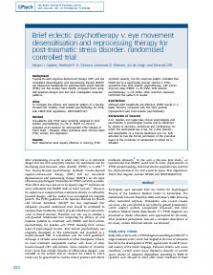Brief eclectic psychotherapy v. eye movement desensitisation and reprocessing therapy for post-traumatic stress disorder: randomised controlled trial
Abstract Background Trauma-focused cognitive–behavioural therapy (CBT) and eye movement desensitisation and reprocessing therapy (EMDR) are efficacious treatments for post-traumatic stress disorder (PTSD), but few studies have directly compared them using well-powered designs and few have investigated response patterns. Aims To compare the efficacy and response pattern of a trauma-focused CBT modality, brief eclectic psychotherapy for PTSD, with EMDR (trial registration: ISRCTN64872147). Method Out-patients with PTSD were randomly assigned to brief eclectic psychotherapy (n = 70) or EMDR (n = 70) and assessed at all sessions on self-reported PTSD (Impact of Event Scale – Revised). Other outcomes were clinician-rated PTSD, anxiety and depression. Results Both treatments were equally effective in reducing PTSD symptom severity, but the response pattern indicated that EMDR led to a significantly sharper decline in PTSD symptoms than brief eclectic psychotherapy, with similar drop-out rates (EMDR: n = 20 (29%), brief eclectic psychotherapy: n = 25 (36%)). Other outcome measures confirmed this pattern of results. Conclusions Although both treatments are effective, EMDR results in a faster recovery compared with the more gradual improvement with brief eclectic psychotherapy.
Geachte bezoeker,
De informatie die u nu opvraagt, kan door psychotraumanet niet aan u worden getoond. Dit kan verschillende redenen hebben,
waarvan (bescherming van het) auteursrecht de meeste voorkomende is. Wanneer het mogelijk is om u door te verwijzen naar de bron
van deze informatie, dan ziet u hier onder een link naar die plek.
Als er geen link staat, kunt u contact opnemen met de bibliotheek,
die u verder op weg kan helpen.
Met vriendelijke groet,
Het psychotraumanet-team.
In: The British Journal of Psychiatry, ISSN 0007-1250 | 200 | 3 | 224-231
http://bjp.rcpsych.org/content/200/3/224.short


